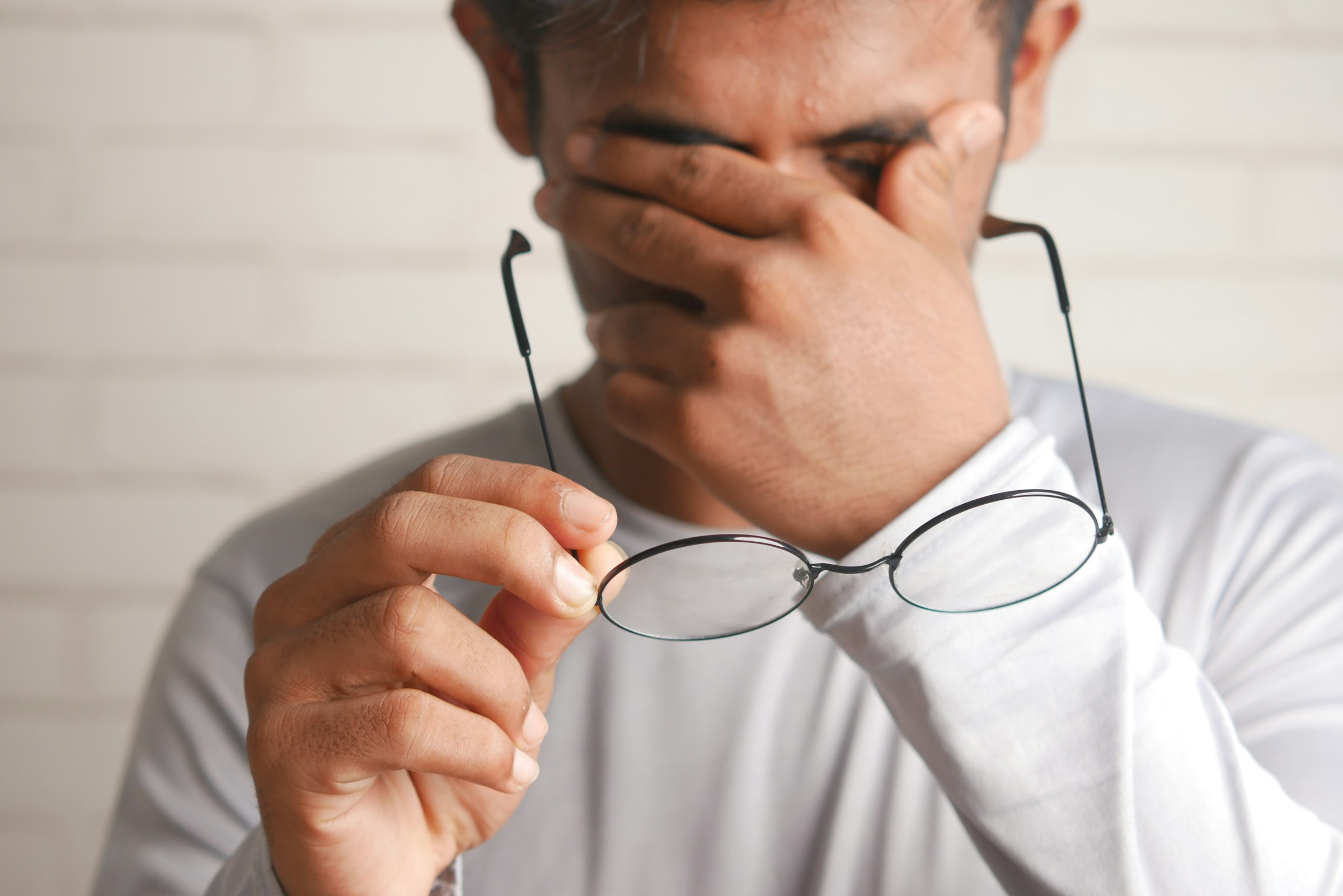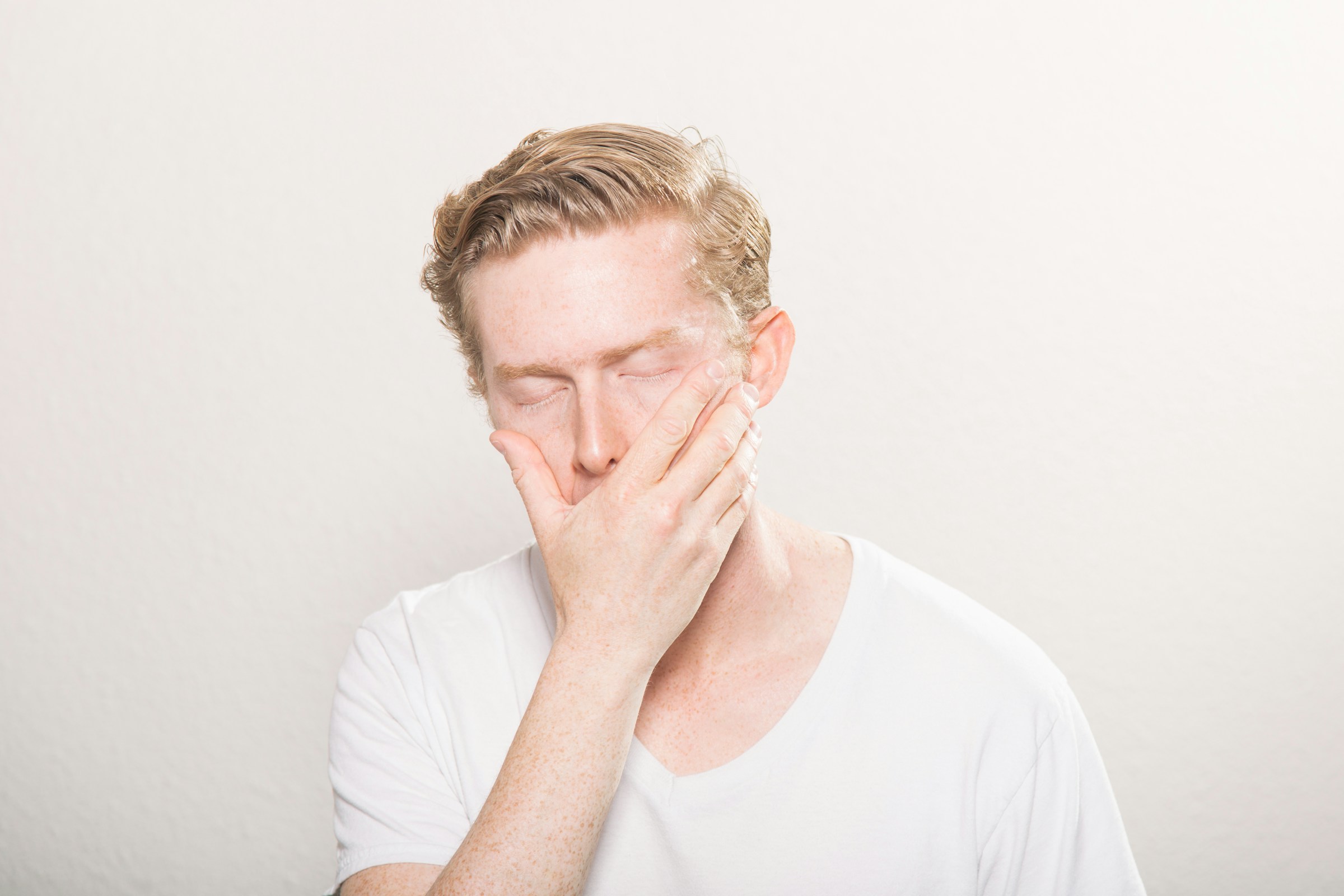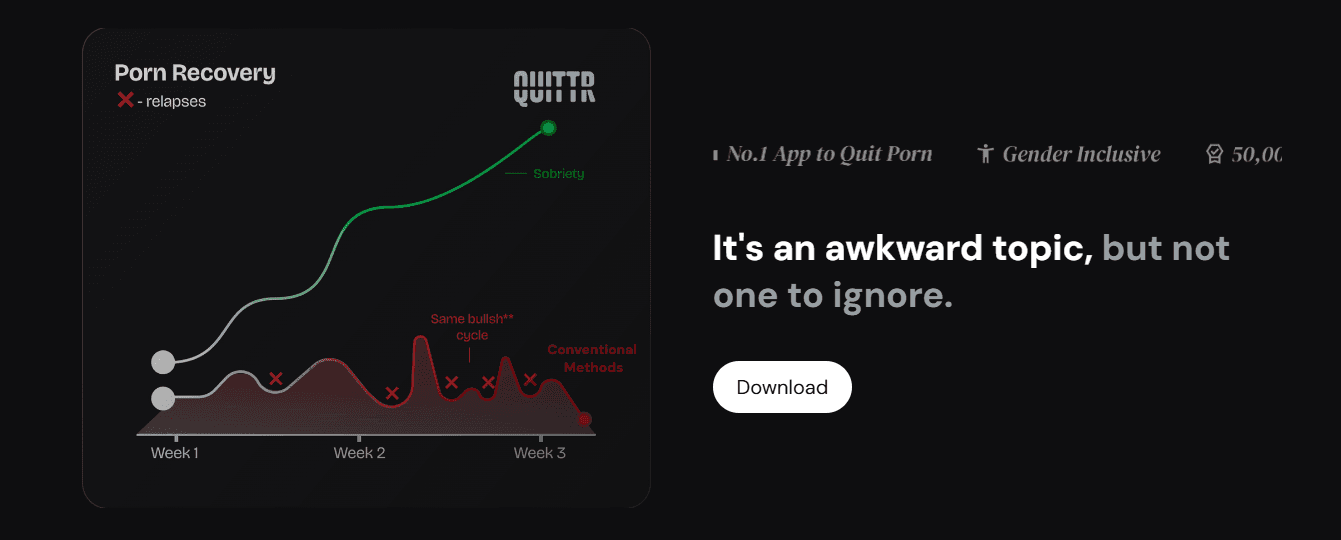Why Masturbation Withdrawal Can Feel Difficult and How to Handle It
You decide to quit porn. You’ve heard the benefits. You’re motivated. But just a few days in, you find yourself feeling emotionally off. You’re irritable and restless. You can’t concentrate, and your sleep is disturbed. You’re also having unusually vivid dreams, and they all seem to involve sex. Your mind keeps drifting back to porn, and you feel a strong urge to revisit your old habits. What you’re experiencing is withdrawal, and it can be challenging. Masturbation withdrawal happens when you quit or significantly reduce your porn use. Utilizing porn addiction apps can be a helpful tool in this journey. This guide will help you know why this happens and what to expect as you navigate the process.
Quittr is an app that helps you stop watching porn. Using this app can help you manage your goals and track your progress as you reduce your dependency on porn and masturbation.
Table of Contents
Why Does Masturbation Withdrawal Feel Difficult?

Masturbation withdrawal refers to the physical, emotional, and psychological challenges individuals face when they reduce or stop habitual masturbation. For those who use masturbation as a frequent outlet for stress, pleasure, or coping with negative emotions, stopping can feel like a daunting task. While not a medically recognized withdrawal syndrome like substance addiction, the symptoms can be intense due to the brain’s reliance on the dopamine reward system.
The Science of Masturbation Withdrawal
Withdrawal happens when the brain and body adjust to the absence of habitual behavior that releases regular dopamine. Masturbation, like other behaviors that trigger pleasure, can become a crutch for dealing with discomfort or boredom.
The Psychological Process of Masturbation Withdrawal
Habits form neural pathways in the brain. When those pathways are suddenly interrupted, individuals may feel lost or discomfort as the brain struggles to adapt. Porn consumption often accompanies frequent masturbation, compounding the issue. Porn overstimulates the brain, creating unrealistic expectations of pleasure and intimacy. When this stimulation is removed, withdrawal symptoms intensify.
The Tough Stuff: Why Masturbation Withdrawal is Hard
Stopping habitual masturbation affects both the mind and body because it disrupts well-established coping mechanisms and dopamine cycles. The challenges often stem from a combination of physiological and psychological factors:
Dopamine Dependency
Masturbation provides quick, reliable bursts of dopamine. When this source is removed, the brain craves the “high,” leading to restlessness, irritability, and cravings. Over time, the brain becomes less responsive to natural dopamine sources, making daily activities less rewarding.
Psychological Factors
Many individuals use masturbation as a way to manage stress, loneliness, or negative emotions. Removing this coping mechanism can leave individuals feeling vulnerable and unsure of how to handle emotional discomfort. Shame or guilt surrounding the habit can make it harder to discuss or seek help, intensifying feelings of isolation.
Cultural Stigma and Internal Conflict
In societies where open discussions about masturbation are taboo, individuals may struggle to reconcile their behavior with cultural or religious values. This stigma can lead to feelings of inadequacy, guilt, and secrecy, making it more challenging to acknowledge and address withdrawal symptoms.
Example of Masturbation Withdrawal in Action
A Reddit user shared their experience: “When I stopped, I felt completely lost. I couldn’t sleep, and I was snapping at everyone. It was like I couldn’t focus on anything. I didn’t realize how much I relied on it to escape stress and boredom.” This reflects how deeply ingrained the behavior can become daily, affecting emotional regulation and overall well-being.
Stats and Context on Masturbation Withdrawal
Research highlights the prevalence and potential challenges of habitual masturbation:
Prevalence
A study in the Journal of Sexual Medicine found that nearly 74% of men and 48% of women masturbate regularly, with a significant percentage engaging in it daily.
Mental Health Links
Studies indicate that compulsive sexual behavior, including excessive masturbation, is associated with increased anxiety and depression.
Brain Effects
Neuroimaging studies reveal that over time, the brain’s reward center becomes less sensitive, requiring more stimulation to achieve the same level of satisfaction.
Common Symptoms of Porn & Masturbation Withdrawal (15 Key Signs + How to Handle Each)

1. You start craving more sex.
This is one of the first things people notice. The moment you stop, your body starts freaking out a little because it's not used to this new normal. Suddenly, everything feels more sexual — random thoughts, dreams, even people on the street. Your brain is saying, “Where’s my usual dopamine hit?” This spike in desire is typical during the first few days, especially if you used porn or masturbation to feel good or relax. The best way to handle it? Stay busy. Go for a walk, call someone, or open the QUITTR app and log the feeling. Don’t sit around doing nothing — boredom feeds the cravings.
2. You get restless and can’t sleep properly.
A lot of people find that their sleep gets worse before it gets better. You lie in bed, tossing and turning, your mind racing. It feels like your body’s buzzing or like you have this weird energy you can’t shake off. That’s because you’re used to winding down with masturbation, and now your brain doesn’t know how to relax. The solution isn’t to go back to old habits — it’s to reset your system.
Try a cold shower before bed.
Put your phone away early.
Use calming sounds or breathing exercises inside QUITTR.
It might take a few nights, but your sleep will balance out once your body learns how to chill without the usual release.
3. You feel tired even though you’re not doing much.
It’s kind of ironic — you’re sleeping less, and even when you do sleep, it doesn’t feel refreshing. You wake up groggy, drag through the day, and your brain feels like it’s in low power mode. This is your dopamine system trying to readjust. Everything might feel “blah” for a while — like food tastes bland, music doesn’t hit, and conversations feel flat. Don’t panic. This phase passes. Hydrate. Move your body a bit. Get sunlight. And track your mood in the app to remind yourself that this fog is temporary.
4. You get angry or irritated for no reason.
One minute you’re fine, the next you're mad at your charger for not plugging in properly. Small things set you off. That’s not “you being dramatic” — it’s withdrawal. You used to use porn or fapping to chill out, and now your brain has no outlet. The emotions don’t disappear — they just come up raw. Try journaling. Say out loud what you’re feeling. Punch a pillow if you need to. The goal isn’t to suppress it — it’s to let it move through you without going back to the habit.
5. You feel randomly sad or numb.
It’s not that something bad happened; you just feel low. Some people call this “flatline.” You’re not horny, you’re not happy, you’re not motivated. You’re just... empty. This stage can mess with your head because it makes you question if quitting is even worth it. But this is precisely when your brain is starting to reset. Stay consistent. Connect with someone. Do one small thing every day that feels healthy, even if you don’t feel like it. That’s how you climb out.
6. You start dreaming about porn or sex.
The dreams are weirdly vivid. Sometimes they’re hot, disturbing, sometimes both. You wake up feeling guilty, even though you didn’t do anything. This is just your brain processing the change. It’s detoxing. Don’t count this as a relapse. Just wake up, shake it off, and move on. Suppose you feel triggered, open QUITTR and log the dream. You’ll feel more in control just by acknowledging it.
7. You get strong urges out of nowhere.
They hit when you're bored. Or when you see a random picture. Or when you're alone in your room and your brain whispers, “Just one time.” These spikes are regular — but they pass if you don’t feed them. The trick is not to argue with the urge, just let it rise and fall. Distract yourself quickly. Go outside. Stretch. Use the emergency button in the QUITTR app. Don’t wait around for it to “go away” — make a move.
8. You feel like no one gets it.
Friends don’t understand. Maybe they even tease you for quitting. You might feel alone or weird for trying to do something that others think is “not a big deal.” That isolation can make it harder. But you’re not weird — you’re strong for choosing growth. If you can’t talk to anyone around you, consider using a forum or the app’s journal. You’ll be surprised how many people are fighting the same battle.
9. You start avoiding people or real intimacy.
Without even meaning to, you start pulling away. Talking to someone feels awkward. Making eye contact feels too personal. That’s because porn used to offer you a shortcut — a connection without risk. Now you’re face-to-face with real human energy, and it’s scary. Don’t force deep conversations right away, but try saying hi, making small talk, or being around people. It helps rewire your sense of connection.
10. You overdo other stuff to fill the gap.
Some people start eating more. Others scroll endlessly or binge-watch shows. That’s your brain looking for a replacement dopamine hit. And that’s okay — just notice it. You don’t have to be perfect. If you find yourself zoning out for hours, pause and ask, “Is this helping me feel better or just avoiding something?” Replacing one compulsion with another doesn’t fix the root. Take a break, do one healthy thing, and ease back in.
11. You feel an intense wave of guilt.
Even if you haven’t relapsed, you start beating yourself up — for past behavior, for struggling, for not being further along. This inner critic gets loud during withdrawal. Don’t believe everything it says. You’re not a failure. You’re healing. And shame is just the voice of the old habit trying to keep you stuck. Practice being kind to yourself — even if it feels weird.
12. You get random physical tension.
Neck stiffness, jaw clenching, and a tight chest. Sometimes your body holds stress that used to get released through fapping. Movement helps here. Stretch. Shake out your arms. Dance for two minutes to music. It’s not about exercise — it’s about letting your body let go.
13. You feel like your brain is “itching.”
It’s hard to describe, but there’s this feeling like your mind is buzzing or itching for stimulation. You want to click something, do something, feel something. That’s dopamine hunger. You don’t need to give in — just switch your focus. Play a quick game. Wash your face. Switch your scenery. The “itch” always fades if you don’t scratch it.
14. You start questioning everything.
“Why am I doing this?” “Is it even worth it?” “Maybe I’m overreacting.” These thoughts usually show up during the uncomfortable middle phase. It’s part of the resistance. Your brain wants you to go back, and it will say anything to convince you. Write out your “Why” again. Look at your streak. Remind yourself how far you’ve come.
15. You feel like quitting the whole journey.
The hardest days aren’t the first ones — they’re the ones where you feel stuck and invisible. You’re doing the work, but it feels like nothing’s changing. That’s where most people quit. But this is also the point where the real change starts — right after the silence, the shift happens. Keep going. One day, you’ll wake up and realize the urges aren’t as loud anymore.
Why Masturbation Withdrawal Feels Challenging

Masturbation withdrawal feels difficult for several reasons, both psychological and physiological. Individuals trying to quit experience withdrawal symptoms akin to those of substance use. Understanding why it feels so hard can help you make sense of the struggle.
Dopamine Dependency: Why Quitting Masturbation Feels Like a Drug Withdrawal
Masturbation triggers a significant release of dopamine, the brain’s “feel-good” neurotransmitter. Over time, the brain relies on this spike to feel pleasure or regulate mood. Quitting masturbation causes a sudden drop in dopamine, which leads to withdrawal symptoms such as irritability, low mood, and cravings. One Reddit user described this experience: “It felt like my brain was screaming for that rush. Everything else seemed dull, and I just wanted the quick fix.” Without dopamine surges, everyday activities may feel less rewarding and make it harder to stay motivated.
Habitual Conditioning: The Automatic Response to Masturbation Triggers
Repeated behaviors create neural pathways in the brain. These pathways allow the brain to automate functions so that we can perform them without conscious thought, which frees up mental resources for other tasks. Masturbation can become an automatic response to triggers like stress, boredom, or loneliness. Breaking this cycle requires rewiring these pathways, which takes time and effort. You might find yourself reaching for your phone or seeking privacy out of habit, even if you’ve resolved to quit. These automatic responses are hard to resist because they’re deeply ingrained, often occurring without conscious thought.
Emotional Coping Mechanism: Masturbation as a Way to Escape Negative Feelings
Masturbation often acts as a way to escape or numb negative emotions such as anxiety, sadness, or frustration. When the habit is removed, individuals must confront their feelings without their usual coping mechanism. For example, someone who uses masturbation to deal with work stress might feel overwhelmed without a similar outlet for relief. The underlying emotional issues that masturbation masked can resurface, making the withdrawal process feel emotionally intense.
Social and Cultural Normalization: Why Quitting Feels Isolating
Society often normalizes masturbation, portraying it as a harmless or essential part of life. This can make quitting feel isolating or unnecessary. Friends or peers might dismiss your efforts, further complicating your resolve. You may feel self-conscious or second-guess your decision to retire if others downplay your struggle or label it unnecessary. Facing societal narratives while dealing with withdrawal can lead to self-doubt or feelings of isolation.
Physical and Psychological Cravings: Masturbation as a Quick Outlet for Stress Relief
Masturbation provides a quick release of physical tension and mental stress. When you quit, the lack of this outlet can result in both physical and psychological cravings. These cravings can be triggered by anything from stress to exposure to sexual content. For example, you might experience an intense urge after encountering an external trigger, like a provocative scene in a movie or an idle moment. Cravings are unpredictable and can make it feel like your efforts to quit are futile, especially during moments of weakness.
How to Handle Masturbation Withdrawal
The Science Behind Quittr: How the App Uses Evidence-Based Practices to Help You Quit Porn
QUITTR is rooted in science. The app's evidence-based tools and features empower users to quit porn by addressing both the behavioral and emotional aspects of addiction. For example, meditation exercises, AI therapist chat, education lessons, and recovery journals help users manage withdrawal symptoms and cope with life without porn. In contrast, content blockers, streak trackers, and leaderboards are effective ways to change habits and create a structure for quitting. Together, these features help users build a solid foundation for recovery and replace unhealthy behaviors with healthier coping mechanisms.
What Can You Expect from Quittr’s 28-Day Challenge?

To help you quit porn, Quittr offers a structured 28-day challenge to help you build momentum for recovery. The program encourages you to compete with others for the longest streak of days without porn. The challenge is a great way to stay accountable and creates a gamified experience to make quitting more fun. Each day of the challenge provides users with actionable advice and practical tools to help them overcome porn addiction.




